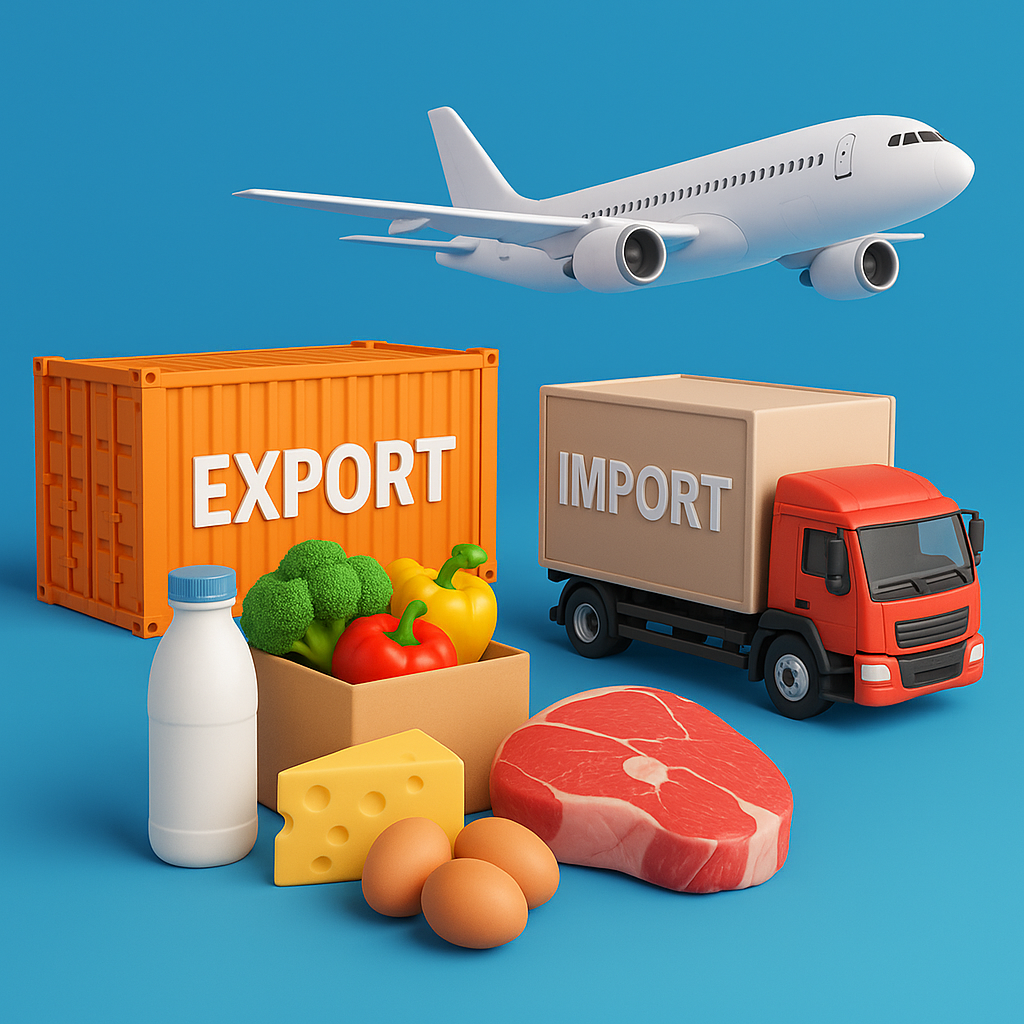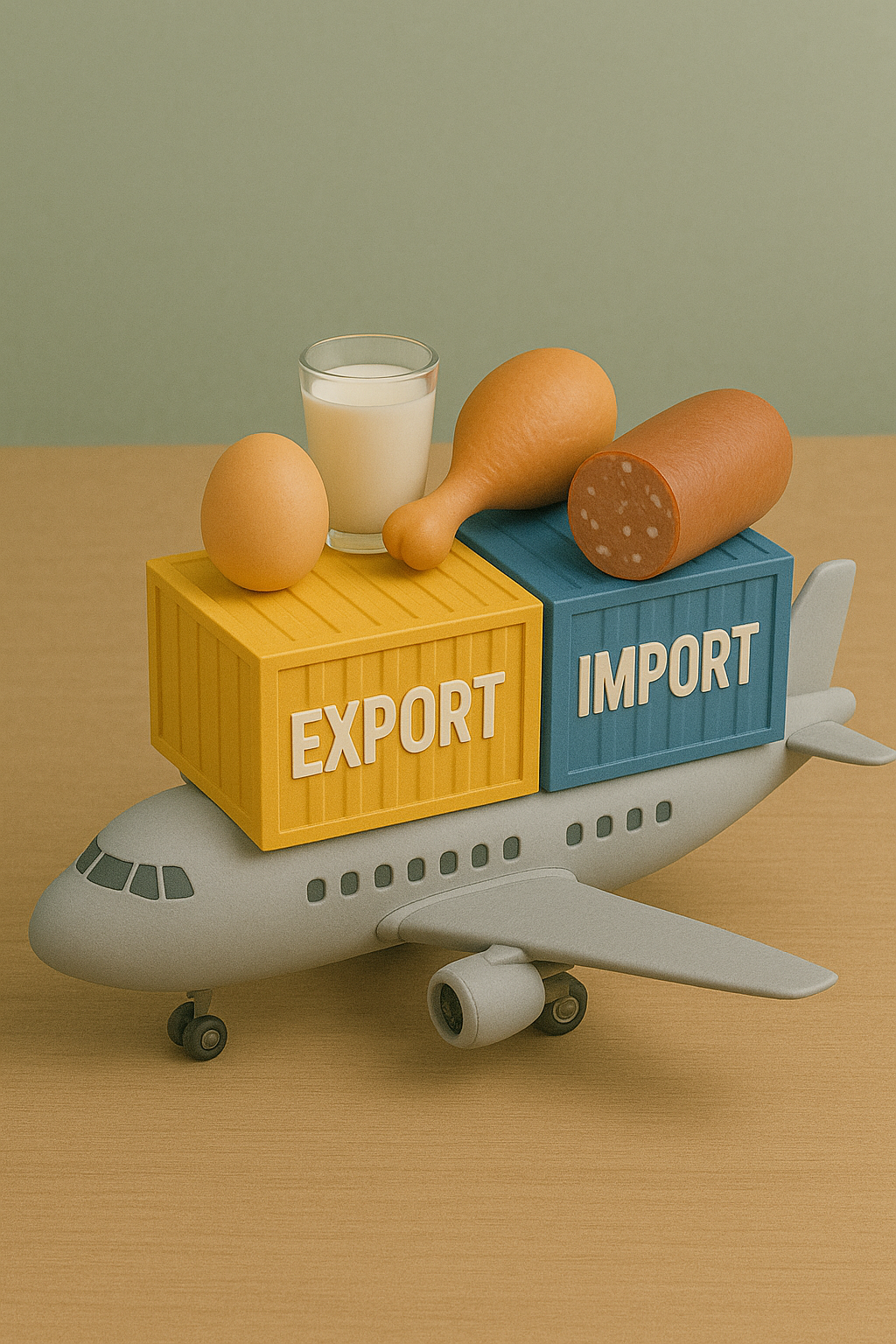مرحبًا بكم في متجر الاستيراد والتصدير حيث نقدم لكم دليلًا شاملًا حول متطلبات تصدير المنتجات الغذائية خارج المملكة العربية السعودية. إذا كنت تبحث عن معلومات دقيقة حول ما هي المتطلبات لتصدير المواد الغذائية، فإنك في المكان الصحيح.
تتضمن متطلبات تصدير المنتجات الغذائية عدة جوانب هامة، منها حصولك على التراخيص اللازمة من الجهات المختصة، والتأكد من مطابقة منتجاتك للمواصفات والمعايير الدولية. كما يجب عليك الالتزام باللوائح الصحية والزراعية، بالإضافة إلى الحصول على شهادات المنشأ والفحوصات اللازمة.
إذا كنت ترغب في معرفة المزيد حول كيفية تصدير المنتجات الغذائية وما هي الإجراءات التي يجب اتباعها، فإننا هنا لمساعدتك في كل خطوة على الطريق. تواصل معنا اليوم واكتشف كيف يمكننا مساعدتك في تحقيق أهداف التصدير الخاصة بك.

مقدمة
تُعد المملكة العربية السعودية من الدول الرائدة في تصدير المواد الغذائية إلى العديد من الأسواق العالمية، مدعومة بجودة الإنتاج وتنوع السلع. إلا أن عملية التصدير لا تتم بشكل عشوائي، بل تتطلب الالتزام بمجموعة من الاشتراطات الفنية والصحية والقانونية، التي تضمن سلامة المنتجات وقبولها في الأسواق الدولية.
خطوات تصدير المواد الغذائية: الاحتياجات والمتطلبات الأساسية
أول خطوة في تصدير المواد الغذائية هي التسجيل كمصدر معتمد لدى الجهات المختصة، مثل هيئة الغذاء والدواء ووزارة البيئة والمياه والزراعة. بعد ذلك يجب تجهيز:
- رخصة تجارية صالحة.
- شهادة منشأ.
- فواتير وشهادات مطابقة للمواصفات.
- قائمة بمكونات المنتج وطرق تعبئته وتخزينه.
دليل شامل لعمليات تصدير المواد الغذائية من السعودية إلى الخارج
تشمل العمليات ما يلي:
- دراسة الأسواق المستهدفة ومتطلباتها.
- التأكد من توافر البنية التحتية اللازمة للنقل والتغليف.
- اختيار وسيلة شحن آمنة (جوية أو بحرية).
- توفير شهادات تحليل مخبري تؤكد جودة وسلامة المنتج.
- التعاون مع وكلاء شحن ذوي خبرة في التصدير.
ما هي الشهادات المطلوبة لتصدير المواد الغذائية خارج السعودية؟
- شهادة مطابقة المنتج لمواصفات البلد المستورد.
- شهادة صحية من الهيئة العامة للغذاء والدواء.
- شهادة حلال (إن تطلب السوق ذلك).
- شهادة تحليل مخبري.
- شهادة منشأ مصدقة من الغرفة التجارية.
شروط السلامة الغذائية في تصدير المواد: ما يجب معرفته
يشترط في جميع المنتجات الغذائية أن تكون:
- خالية من المواد الضارة والمبيدات.
- معبأة بطريقة صحية تحافظ على الجودة.
- مرفقة بتواريخ إنتاج وانتهاء واضحة.
- مستوفية لمعايير التخزين ودرجات الحرارة.
متطلبات التصدير: كيفية تلبية معايير جودة المواد الغذائية
من الضروري اتباع أنظمة HACCP وISO لضمان سلامة الغذاء. كما يجب الحصول على تقارير من مختبرات معتمدة، ومراقبة الجودة طوال سلسلة الإنتاج.
معايير التصدير: كيف تضمن نجاح تصدير المواد الغذائية من السعودية؟
- دراسة متطلبات السوق المستهدف.
- إعداد تغليف ملائم ومتوافق مع المعايير العالمية.
- توثيق كافة البيانات الفنية والمكونات.
- الحفاظ على سمعة العلامة التجارية من خلال الالتزام بالمواعيد والجودة.
تصدير المواد الغذائية إلى الخارج: الإجراءات القانونية والجمركية
- فتح ملف لدى هيئة الزكاة والضريبة والجمارك.
- تعبئة نموذج البيان الجمركي.
- دفع الرسوم الجمركية إن وجدت.
- التنسيق مع الجهات المختصة في الموانئ والمنافذ.
العقبات المحتملة أمام تصدير المواد الغذائية وكيفية التغلب عليها
- اختلاف المواصفات والمعايير.
- بطء الإجراءات الجمركية.
- ارتفاع تكاليف النقل.
- حلول مقترحة:
- العمل مع مستشارين متخصصين.
- استخدام شركات شحن موثوقة.
- الاستفادة من برامج الدعم الحكومية.
نصائح للمزارعين ورجال الأعمال لتحقيق شروط تصدير المواد الغذائية بنجاح
- الاستثمار في جودة التغليف والتعبئة.
- إنشاء شراكات مع موزعين في الخارج.
- تحديث المعلومات الفنية للمنتج باستمرار.
- المشاركة في المعارض الدولية لتوسيع القاعدة السوقية.
الاشتراطات الأساسية لتصدير المواد الغذائية من السعودية: دليل شامل
- اعتماد المنشأة لدى الجهات التنظيمية.
- الالتزام بالمتطلبات الصحية والغذائية.
- توفير كافة المستندات القانونية.
- توثيق سلسلة التوريد.
- الالتزام بأنظمة ولوائح الدول المستوردة.
كيف تضمن تصدير المواد الغذائية بنجاح من المملكة؟
- التخطيط الجيد والتعرف على تفاصيل السوق.
- ضمان جودة المنتجات بشكل مستمر.
- إنشاء فريق عمل متخصص في التصدير.
- استخدام قنوات ترويج فعالة دولياً.
تعرف على المتطلبات القانونية لتصدير الأغذية خارج السعودية
- قانون الجمارك.
- أنظمة هيئة الغذاء والدواء.
- لوائح وزارة التجارة.
- متطلبات السوق المستهدف من حيث التركيب والمواصفات.
خطوات مهمة لتلبية اشتراطات تصدير المواد الغذائية من السعودية
- إعداد وثائق الشحن والتصدير.
- تعبئة البيان الجمركي.
- توثيق المنتج بشهادة مطابقة.
- الحصول على شهادة منشأ.
متطلبات السلامة الغذائية لتصدير المنتجات الغذائية السعودية
- التحكم في نقاط الخطر.
- تحليل المخاطر HACCP.
- تأكيد خلو المنتجات من الملوثات.
- مراقبة ظروف النقل والتخزين.
الاشتراطات الصحية والفنية لتصدير المواد الغذائية: كل ما تحتاج معرفته
- اختبارات بكتيرية وكيميائية.
- التأكد من سلامة المواد الأولية.
- توافق طريقة الإنتاج مع اللوائح الدولية.
تصدير المواد الغذائية: الوثائق اللازمة والإجراءات المطلوبة
- شهادة منشأ.
- بيان جمركي.
- شهادة صحية.
- تقرير مختبر.
- بوليصة شحن.
كيف تؤثر معايير الجودة على تصدير المواد الغذائية السعودية؟
- تعزز قبول المنتج في الأسواق الخارجية.
- تقلل احتمالات رفض الشحنات.
- ترفع من تقييم العلامة التجارية.
اشتراطات تصدير المواد الغذائية للمملكة المتحدة: ما ينبغي معرفته
- الامتثال لمواصفات هيئة المعايير البريطانية.
- شهادة حلال معتمدة.
- تسجيل المنتج في نظام TRACES.
- موافقة من الهيئة البيطرية والغذائية.
التحديات والفرص في تصدير المواد الغذائية من السعودية إلى الأسواق الدولية
التحديات:
- المنافسة الشديدة.
- تفاوت المواصفات.
- ارتفاع التكاليف.
الفرص:
- تنامي الطلب على المنتجات السعودية.
- دعم حكومي متزايد للمصدرين.
- تطور وسائل النقل والتخزين.
أساسيات تصدير الأغذية من السعودية: المتطلبات الأساسية

لتصدير الأغذية من السعودية بشكل فعال، يجب أن يكون لدى المصدرين فهم جيد للأساسيات اللازمة لإنجاح هذه العملية. هناك العديد من المتطلبات الأساسية التي يجب مراعاتها:
- التراخيص: يجب الحصول على التراخيص من الجهات المعنية مثل هيئة الغذاء والدواء السعودية.
- الشهادات: من الضروري الحصول على الشهادات الصحية المطلوبة لضمان سلامة المنتجات.
- المستندات: إعداد الأوراق اللازمة مثل فواتير الشحن وشهادات المنشأ يساهم في تسهيل إجراءات التصدير.
تجربة أحد الأصدقاء في تصدير التمر إلى أوروبا توضح كيف أن الترتيبات المسبقة تساهم في نجاح العملية، حيث تم استكمال كافة المتطلبات بشكل دقيق مما مكنه من استقطاب عملاء جدد.
أساسيات تصدير الأغذية من السعودية: المتطلبات الأساسية
عند الحديث عن تصدير الأغذية من السعودية، من المهم التركيز على المتطلبات الأساسية التي تضمن نجاح هذه العملية. أبرز المتطلبات:
- التراخيص الضرورية: للحصول على تراخيص التصدير، يجب التوجه للجهات المختصة مثل هيئة الغذاء والدواء السعودية.
- الشهادات الصحية: من المهم الحصول على شهادات تثبت أن المنتجات آمنة للاستهلاك.
- المستندات المطلوبة: الوثائق كالصور الرسمية للمنتجات وفواتير الشحن تلعب دورًا حاسمًا في تسهيل الإجراءات.
أحد الأصدقاء الذي عمل في تصدير زيت الزيتون أخبرني كيف أن التحقق من الشهادات والمستندات قبل الشحن أنقذ مشروعه من التأخير. التنظيم الجيد دائمًا يحقق نتائج أفضل.
المتطلبات القانونية لتصدير الأغذية من السعودية : دليل شامل
تصاريح الأغذية
لبدء عملية تصدير الأغذية، يحتاج المصدرون إلى الحصول على تصاريح منفصلة من الجهات المختصة. هذه التصاريح تعتبر خطوة أساسية لضمان توافق المنتجات مع المعايير المحلية والدولية.
الشهادات الصحية
الشهادات الصحية ضرورية لتأكيد سلامة المنتجات الغذائية. تضمن هذه الشهادات أن المنتجات تم فحصها وأنها آمنة للاستهلاك. يجب على المصدرين التأكد من تجديد هذه الشهادات بشكل دوري لتفادي أي عوائق.
الأوراق اللازمة لتسهيل عملية التصدير
تتطلب إجراءات التصدير مجموعة من الأوراق اللازمة مثل:
- فواتير الشحن
- شهادات المنشأ
- مستندات الفحص والتفتيش
تجربة شخصية لأحد المزارعين بالمملكة تؤكد أن تنظيم هذه الأوراق بشكل مسبق ساهم في تسريع عملية الشحن إلى الأسواق الخارجية.
خطوات تصدير الأغذية إلى الخارج: ماذا تحتاج؟
تجهيز المستندات المطلوبة
قبل البدء في عملية التصدير، يجب على المصدرين تجهيز جميع المستندات اللازمة. تشمل هذه المستندات:
- رخصة التصدير
- الشهادات الصحية
- فواتير الشحن
- شهادات المنشأ
تجربة أحد الأصدقاء تُبرز كيف أن التحضير المسبق لهذه الأوراق ساهم في تسريع إجراءات الشحن وتفادي أي تأخير غير متوقع.
التحقق من القوانين المحلية والدولية
يجب التحقق دائمًا من القوانين المحلية والدولية المتعلقة بتصدير الأغذية. قد تختلف هذه القوانين من دولة إلى أخرى، لذا من الضروري:
- الاطلاع على المعايير المحلية
- مراجعة متطلبات الدولة المستوردة
تجربة شخصية تُظهر أن الفهم الجيد للقوانين ساعد أحد المصدرين على تجنب غرامات باهظة أثناء تصدير منتجاته إلى الأسواق الأوروبية.
الشروط والمتطلبات لتصدير المنتجات الغذائية خارج المملكة
شروط الجودة
عند تصدير المنتجات الغذائية، من الضروري مراعاة شروط الجودة لحماية سمعة المنتج السعودي. تشمل هذه الشروط:
- اختبارات الجودة: يجب أن تُجرى اختبارات على المنتجات لضمان توافقها مع المواصفات المطلوبة.
- التعبئة والتغليف: استخدام مواد تعبئة ذات جودة عالية لتجنب التلف أثناء النقل.
تجربة أحد الأصدقاء الذي يعمل في تصدير التمور توضح أن انخفاض جودة التغليف أدى إلى خسائر مالية كبيرة بسبب التلف، مما استدعى تحسينات عاجلة.
المعايير الصحية
المعايير الصحية هي عنصر رئيسي في عملية التصدير. تتضمن:
- فحوصات السلامة: التأكد من أن المنتجات خالية من الملوثات والجراثيم.
- الشهادات الصحية: الحصول على شهادات من الجهات المختصة تؤكد جودة وسلامة المنتجات.
تجربة أحد المصدرين تُظهر أن الالتزام بهذه المعايير ساعده في الحصول على عقود جديدة مع العملاء الدوليين، مما يعكس أهمية الالتزام بالمعايير الصحية في السوق العالمية.
كيفية الحصول على تراخيص التصدير للمنتجات الغذائية في السعودية
الشروط اللازمة للحصول على التراخيص
للحصول على تراخيص التصدير للمنتجات الغذائية في السعودية، يجب على المصدرين الالتزام بعدة شروط أساسية تضمن سير العملية بسلاسة. تتضمن هذه الشروط:
- تقديم مستندات سليمة: يجب تقديم كافة المستندات المطلوبة بشكل دقيق، بما في ذلك الشهادات الصحية والتراخيص.
- التسجيل لدى الجهات المعنية: على المصدر التسجيل لدى الهيئة العامة للغذاء والدواء أو أي جهة أخرى ذات صلة.
- التوافق مع معايير الجودة: يجب أن تتوافق المنتجات مع معايير الجودة والسلامة الغذائية المعتمدة.
يمكن أن تكون التجربة ملموسة، حيث يروي أحد الأصدقاء أنه تمكن من الحصول على الترخيص بعد الالتزام بكافة هذه الشروط، مما ساهم في نجاح مشروعه وتوسعه في الأسواق الخارجية.
أهم المعايير الصحية لتصدير الأغذية من السعودية
الالتزام بالمعايير الصحية
لضمان تصدير الأغذية بنجاح من السعودية، يجب الالتزام بالمعايير الصحية التي تضعها الجهات المعنية. هذه المعايير تشمل:
- فحص المنتجات: يجب إجراء فحوصات شاملة على المنتجات قبل التصدير للتأكد من خلوها من الملوثات.
- تقديم الشهادات الصحية: يُلزَم المصدرون بتقديم الشهادات التي تثبت سلامة وجودة منتجاتهم.
أحد الأصدقاء الذي يدير شركة لتصدير العسل يروي كيف أن الالتزام بهذه المعايير ساعده على كسب ثقة عملائه وتمييز منتجاته عن المنافسين. حيث أثبت أن الجودة والسلامة هما مفتاح النجاح في الأسواق العالمية، مما دفعه للتركيز أكثر على تطبيق هذه المعايير بشكل دقيق.
ما هي إجراءات الجمارك لتصدير المنتجات الغذائية؟
تقديم الوثائق اللازمة
تعتبر الوثائق اللازمة جزءًا أساسيًا من عملية تصدير الأغذية. يجب على المصدرين تقديم مستندات مثل:
- شهادات الصحة: لضمان سلامة المنتجات.
- فواتير الشحن: لتوثيق عملية النقل.
- شهادات المنشأ: لتحديد مصدر المنتجات.
تجربة إحدى الشركات التي تصدر التمور تُظهر أهمية تقديم هذه الوثائق بشكل دقيق، حيث أثر تقديم الوثائق الناقصة على توقيت شحناتهم.
الالتزام بالضرائب المفروضة
يُطلب من المصدرين أيضًا الالتزام بالضرائب الجمركية المفروضة على المنتجات. من المهم فهم:
- نسب الضرائب: حيث تختلف الرسوم حسب نوع المنتج.
- الإجراءات المالية: يجب تسديد الضرائب قبل إتمام عملية التصدير.
حالة أحد المزارعين تكشف أن عدم الالتزام بالضرائب أدى إلى تأخير شحناته، مما زاد من التكاليف بشكل كبير. لذا الالتزام بالضرائب يُعتبر جزءًا لا يتجزأ من نجاح عملية التصدير.
تصدير المنتجات الغذائية: الخصوصية والاعتبارات الخاصة بالمصدرين السعوديين
الخصوصيات الثقافية
تعتبر الخصوصيات الثقافية من العوامل المهمة في تصدير المنتجات الغذائية. يحتاج المصدرون السعوديون إلى فهم:
- التفضيلات الغذائية: تختلف الأذواق من سوق إلى آخر، لذا من المهم دراسة مفضلات ثقافات الدول المستوردة.
- التغليف والتعليب: استخدام تصميمات تعبئة تتماشى مع القيم الثقافية قد يسهل قبول المنتجات في الأسواق.
أحد الأصدقاء الذي يصدر التوابل تأكد من توافق تعبئته مع اعتبارات المستهلكين في الهند، مما أدى إلى نجاح مذهل في مبيعاته.
المعايير القانونية المحلية والدولية
بالإضافة إلى ذلك، يتعيّن على المصدرين الالتزام بالمبادئ القانونية. يجب عليهم:
- مراجعة المعايير المحلية: من المهم فهم القوانين التي تحكم عملية التصدير في السعودية.
- عدم تجاهل القوانين الدولية: يجب الالتزام بالمتطلبات القانونية في الدول المستوردة لتفادي أي مشاكل.
عدم الالتزام بهذه المعايير قد يؤدي إلى عواقب قانونية قد تكون مكلفة، لذا التعرف على هذه المتطلبات يُعتبر جزءًا أساسيًا من مسار التصدير الناجح.
متطلبات تصدير المنتجات الغذائية لدول مجلس التعاون الخليجي
الشروط الضرورية لضمان قبول المنتجات في دول الخليج
عند تصدير المنتجات الغذائية إلى دول مجلس التعاون الخليجي، يجب على المصدرين الالتزام بعدة شروط لضمان قبول منتجاتهم. هذه الشروط تشمل:
- التوافق مع المعايير الخليجية: يجب أن تتماشى المنتجات مع المواصفات الخليجية للسلامة والجودة.
- الشهادات الصحية: الحصول على شهادات تؤكد سلامة المنتجات وجودتها أمر واجب، حيث يُمكن أن تختلف المتطلبات من دولة لأخرى.
- توفير المعلومات اللازمة: تقديم معلومات دقيقة عن المنتج، مثل المواد المستخدمة وتاريخ الإنتاج.
أحد الأصدقاء الذي عمل في تصدير العصائر إلى الإمارات يروي أنه بعد التحقق من هذه الشروط، تم استقباله بحفاوة في الأسواق، مما ساهم في زيادة الطلب على منتجاته. لذا، الإعداد الجيد والتنسيق مع الجهات المختصة يُعتبران مفتاح النجاح في هذا المجال.
من السعودية إلى العالم: كيفية تصدير المنتجات الغذائية وفق القوانين الصحيحة؟
الالتزام بالقوانين الدولية والمحلية
لتصدير المنتجات الغذائية بنجاح من السعودية إلى الأسواق العالمية، يُعتبر الالتزام بالقوانين الدولية والمحلية خطوة محورية. إليك بعض النقاط الأساسية للتركيز عليها:
- فهم القوانين المحلية: يجب على المصدرين معرفة المتطلبات والتشريعات الخاصة بتصدير المواد الغذائية من السعودية، والتسجيل لدى الجهات المختصة.
- التوافق مع القوانين الدولية: عندما تُصدَّر المنتجات إلى دول معينة، من الضروري فهم المعايير الصحية والجودة الخاصة بتلك الأسواق.
تجربتي مع أحد المصدرين كانت مثمرة، حيث أكد لي أن الالتزام بتلك القوانين ساعده في تفادي أي عقوبات وضمان سرعة إدخال منتجاته إلى الأسواق. القوانين الصحيحة تُعتبر الأساس الذي يبنى عليه النجاح في عالم التصدير.
الشهادات والفحوصات المطلوبة لتصدير المنتجات الغذائية خارج السعودية
الشهادات الصحية
قبل تصدير المنتجات الغذائية، يجب على المصدرين الحصول على الشهادات الصحية الضرورية. هذه الشهادات تضمن أن المنتج آمن للاستهلاك وقد تم فحصه وفقاً للمعايير الصحية المعتمدة. تشمل العناصر الرئيسية:
- شهادة السلامة الغذائية: تُثبت أن المنتج خالٍ من الملوثات.
- شهادة الفحص الصحي: تُظهر أن المنتج قد خضع للفحص من جهة معتمدة.
تجربة أحد الأصدقاء في تصدير الزعفران أكدت أهمية هذه الشهادات، حيث ساعدت على زيادة الثقة بين المستهلكين.
تحليل المنتجات
إلى جانب الشهادات الصحية، يجب إجراء تحليل شامل للمنتجات. يتضمن ذلك:
- اختبارات معملية: لفحص المكونات الغذائية والتأكد من جودتها.
- تحليل التغليف: لضمان عدم تفاعل المواد مع المنتج بطرق ضارة.
يُظهر التزام المصدرين بإجراء هذه التحليلات تأثيرًا إيجابيًا على سمعة منتجاتهم في الأسواق الخارجية، مما يُسهل عليهم الحصول على عملاء جدد وفتح أسواق جديدة.
دليل شامل لمتطلبات تصدير المنتجات الغذائية خارج السعودية
استعداد جيد
تعتبر الاستعدادات الجيدة خطوة أساسية لضمان نجاح عملية التصدير. يُنصح بتحضير كل ما يلزم مسبقًا، مثل:
- تجميع الوثائق: التأكد من الحصول على كل المستندات المطلوبة مثل الشهادات الصحية وتصاريح التصدير.
- تحديد الأسواق المستهدفة: قم بدراسة الأسواق التي تنوي تصدير منتجاتك إليها واحتياجاتها.
أحد الأصدقاء الذي يعمل في تصدير الأجبان شارك تجربته، حيث أعد في البداية حزمة متكاملة من الوثائق مما سهل عليه العملية لاحقًا.
معرفة المتطلبات اللازمة
فهم المتطلبات اللازمة لكل سوق يُعد أمرًا حيويًا. يجب على المصدرين:
- الإطلاع على القوانين المحلية: تعرف على التشريعات واللوائح الخاصة ببلدك وبلد وجهتك.
- التواصل مع خبراء التصدير: يُفضل الحصول على استشارات من متخصصين يمكنهم توجيهك حول كيفية تلبية جميع المعايير.
إن المعرفة الجيدة بهذه المتطلبات تعزز فرص النجاح في الوصول إلى السوق العالمية دون عوائق.
كيفية تصدير المنتجات الغذائية من السعودية؟ الشروط والإجراءات
الإرشادات الصحيحة
عند التفكير في تصدير المنتجات الغذائية من السعودية، تحتاج إلى اتباع مجموعة من الإرشادات الصحيحة لضمان نجاح العملية. إليك بعض النقاط التي يجب مراعاتها:
- تحضير الوثائق المطلوبة: تأكد من جاهزية جميع الشهادات، مثل الشهادات الصحية وتصاريح التصدير.
- فهم القوانين المحلية والدولية: ادرس القوانين ذات الصلة في كل من السعودية والدول المستهدفة.
أحد الأصدقاء الذين عملوا في تصدير الفواكه الطازجة نصح بضرورة العمل مع مستشارين لديهم خبرة كبيرة في مجال التصدير. حيث ساعدهم ذلك في تجنب الأخطاء الشائعة وضمان تحقيق التحقق السلس لعملياتهم. الالتزام بهذه الإرشادات يُعتبر أساسًا لتحقيق نجاحٍ مستدام في الأسواق العالمية.
تعرف على الوثائق المطلوبة لتصدير المنتجات الغذائية خارج المملكة
فواتير الشحن
تُعتبر فواتير الشحن من الوثائق الأساسية في عملية تصدير المنتجات الغذائية. تشمل هذه الفواتير معلومات مهمة مثل:
- تفاصيل الشحن: تتضمن نوع المنتج والكمية.
- تكلفة الشحن: تساعد في تحديد الرسوم الجمركية المحتملة.
تجربة أحد المصدرين الذين يعملون في تصدير التمور تُظهر أن دقة فواتير الشحن تُساعد على تسريع الإجراءات الجمركية وتفادي أي تأخير.
الشهادات الصحية
الشهادات الصحية ضرورية لضمان سلامة المنتجات الغذائية. يجب أن تتضمن:
- تحليل جودة المنتج: يوفر معلومات عن مكونات المنتج وسلامته.
- تأكيد من الجهات المختصة: تُعطي مصداقية للمنتج في السوق المستهدفة.
أحد الأصدقاء صرح بأن الشهادات الصحية كانت عاملًا حاسمًا في فتح أسواق جديدة، حيث أعجبت المشترين بموافقة المنتج للمعايير الدولية.
المتطلبات الصحية والفنية لتصدير الأغذية من السعودية
شروط صحية دقيقة
لضمان تصدير الأغذية بنجاح من السعودية، يجب الالتزام بشروط صحية دقيقة تضمن سلامة المنتجات وجودتها. أهم هذه الشروط تشمل:
- إجراء فحوصات معملية: يُشترط عمل فحوصات للكشف عن الملوثات والمكونات غير المصرح بها.
- التوافق مع المواصفات الخليجية والدولية: يجب أن تتماشى المنتجات مع المعايير الصحية المعتمدة في الأسواق المستهدفة.
أحد الأصدقاء الذين يصدرون المنتجات الطبيعية أشار إلى أن الالتزام بهذه الشروط كان مفيدًا للغاية. فقد ساعده الالتزام بالمعايير الصحية في الحصول على شهادات موثوقة، مما أدى إلى زيادة الطلب عالميًا. لذا، يُعتبر الفحص الجيد والتوثيق الدقيق لضمان الصحة والسلامة أمرًا ضروريًا لتحقيق النجاح في تصدير الأغذية.
خطوات تصدير المنتجات الغذائية : من السعودية إلى السوق العالمية
إعداد خطة واضحة
عند التفكير في تصدير المنتجات الغذائية من السعودية، يعد إعداد خطة واضحة خطوة أساسية للنجاح. إليك بعض النقاط التي يجب الالتفات إليها:
- تحديد الهدف السوقي: تحديد الدول والمناطق التي ترغب في تصدير المنتجات إليها.
- دراسة السوق: قم بإجراء أبحاث عن تفضيلات المستهلكين والاتجاهات الغذائية.
أحد الأصدقاء الذين أسسوا شركة لتصدير الأعشاب العطرية أكد لي أن وضع خطة مفصلة ساعدهم على تنظيم جهودهم، حيث شملت الخطة تحليل المنافسين وتقدير التكاليف. استثمروا في التعرف على أكثر الأسواق تفاعلًا، مما ساهم في تحقيق نتائج إيجابية في وقت قصير. لذا، تخطيط جيد يُعتبر مفتاحًا لدخول الأسواق العالمية بثقة.
أهم التحديات التي تواجه تصدير الأغذية إلى الخارج
معرفة التحديات المحتملة
عند تصدير المنتجات الغذائية إلى الخارج، يواجه المصدرون عدة تحديات يمكن أن تؤثر على نجاح العملية. من أبرز هذه التحديات:
- التقلبات في الأسعار: يمكن أن تتغير أسعار الشحن والمواد الخام بشكل مفاجئ، مما يؤثر على التكاليف النهائية.
- متطلبات السوق: تختلف متطلبات الأسواق المستوردة من حيث الجودة والمعايير الصحية، مما يستدعي بحثًا دقيقًا.
تجربتي مع أحد المصدرين أكدت أن التكيف السريع مع التغيرات والتحليلات السوقية الدقيقة كانت عوامل حاسمة. حيث قال إنه تمكن من تجاوز تحديات معينة بفضل امتلاكه لطريقة تفكير مرنة وتواصل دائم مع الهيئات المعنية. لذا، يجب أن تكون الوعي والمثابرة جزءًا من استراتيجية التصدير لتحقيق النجاح.
لماذا يجب الالتزام بالمتطلبات عند تصدير الأغذية السعودية؟
الالتزام لضمان سلامة المنتجات
عندما يتعلق الأمر بتصدير الأغذية من السعودية، فإن الالتزام بالمتطلبات المعمول بها يعد من الأمور الحاسمة لضمان سلامة المنتجات. أهمية هذا الالتزام تتجلى في العديد من النقاط:
- حماية المستهلك: الالتزام بالمعايير الصحية يُظهر اهتمام المصدر بجودة المنتج وسلامته، مما يعزز ثقة المستهلك.
- تجنب المشاكل القانونية: الالتزام بالقوانين المحلية والدولية يساعد على تفادي العقوبات والغرامات المحتملة.
تجربتي مع أحد المصدرين تُظهر أن الالتزام بهذه المعايير قد ساعده في تحقيق شراكات تجارية جديدة. حيث حصل على شهادات موثوقة مكّنت منتجاته من دخول أسواق عالمية، مما زاد من الطلب عليها. لذا، يُعتبر الالتزام جزءًا أساسياً في استراتيجية التصدير الناجحة.
دور الهيئة العامة للغذاء والدواء في تصدير الأغذية
الدور الهام في تنظيم العملية
تلعب الهيئة العامة للغذاء والدواء في السعودية دورًا محوريًا في تنظيم عملية تصدير الأغذية، حيث تضمن تلبية المنتجات للمعايير الصحية والاجتماعية. ومن بين مهامها الأساسية:
- فحص المنتجات: تُجري الهيئة اختبارات دقيقة على المنتجات الغذائية قبل منحها الترخيص للتصدير.
- إصدار الشهادات: توفر الهيئة الشهادات الصحية اللازمة التي تؤكد سلامة وجودة المنتجات، مما يسهل دخولها إلى الأسواق العالمية.
أحد الأصدقاء، الذي تمت مقارنة منتجاته بالمعايير الدولية، أكد أن دعم الهيئة كان له أثر كبير في نجاح تصديره. حيث ساعدته الشهادات الصادرة من الهيئة في كسب ثقة عملائه على المستوى الدولي، مما انعكس إيجابًا على سمعة علامته التجارية ونجاح أعماله. لذا، يُعتبر التعاون مع الهيئة خطوة حيوية لكل مصدر سعودي.
الاشتراطات الضرورية لتصدير المنتجات الغذائية خارج المملكة
يجب على الشركات التي ترغب في تصدير المنتجات الغذائية خارج المملكة اتباع الاشتراطات الضرورية. يشمل ذلك التأكد من أن المنتجات تلبي معايير الجودة والسلامة الغذائية المطلوبة من الهيئات الصحية المعتمدة. بالإضافة إلى ذلك، يجب الامتثال لجميع المعايير القانونية والتشريعات ذات الصلة.
الاشتراطات الصحية
يجب على المصدرين الالتزام بالاشتراطات الصحية عند تصدير المواد الغذائية. يُحث على ضمان نظافة وسلامة المنتجات، والتأكد من عدم تلوثها بأي مواد ضارة. يشمل ذلك مراقبة درجات الحرارة والتخزين السليم، بالإضافة إلى اختبارات الجودة الدورية التي يجب إجراؤها.
الاشتراطات البيطرية
يُعتبر الامتثال للاشتراطات البيطرية ضروريًا عند تصدير المنتجات الغذائية. يجب على المصدرين التأكد من خلو المنتجات من الأمراض الحيوانية، وضمان سلامة الحيوانات والنباتات المستخدمة في إنتاجها. تطبيق قوانين مكافحة الأمراض الحيوانية والنباتية مهم لضمان قبول المنتجات في الأسواق الدولية.
كيفية الحصول على تصاريح تصدير المواد الغذائية من السعودية
يتطلب تصدير المواد الغذائية من السعودية الحصول على تصاريح رسمية. يجب على المصدرين القيام بإجراءات إدارية محددة وامتثال التوجيهات القانونية. يجب التواصل مع الجهات المعنية والحصول على الموافقات الضرورية لضمان تسهيل عملية التصدير بنجاح.
الإجراءات الإدارية
يتطلب تصدير المواد الغذائية من السعودية اتباع إجراءات إدارية محددة. يجب على المصدرين تقديم الوثائق اللازمة والحصول على التصاريح المناسبة من الجهات المعنية. ينبغي عليهم التأكد من اتباع القوانين والتوجيهات الخاصة بعملية التصدير والامتثال للمعايير الدولية.
التوجيهات القانونية
يجب على المصدرين الامتثال للتوجيهات القانونية عند تصدير المواد الغذائية من السعودية. يجب الامتثال للقوانين والتشريعات المحلية والدولية ذات الصلة. يجب عليهم التحقق من جميع اللوائح والتعليمات المتعلقة بعملية التصدير وضمان أن جميع المتطلبات القانونية تتوافق معها.
عملية تصدير المواد الغذائية والمستندات المطلوبة
يتضمن عملية تصدير المواد الغذائية من السعودية إلى الخارج مجموعة من المستندات الضرورية مثل فواتير الشحن وشهادات المنشأ. يجب على المصدرين تجهيز هذه المستندات بعناية لضمان سلاسة عملية التصدير. كما يجب التأكد من توافر جميع المستندات المطلوبة وصحتها قبل شحن المنتجات.
خطوات التصدير
يبدأ العمل بتحديد السلع المراد تصديرها ومكان وجهتها. ثم يجب الحصول على تصريح التصدير من الجهات المختصة. بعد ذلك، يتم التأكد من مطابقة المنتجات للمعايير الدولية وتحديد وسيلة النقل المناسبة. أخيرًا، يتم استعداد المستندات الضرورية وشحن البضائع بعناية.
المستندات الضرورية
يعتبر تصدير المواد الغذائية عملية تحتاج إلى مستندات مهمة، مثل فواتير التصدير وشهادات المنشأ. يجب على الشركات الالتزام بتجهيز هذه الوثائق بعناية ودقة لضمان سلامة الشحنات وامتثالها للقوانين واللوائح الدولية.
متطلبات التعبئة والتغليف لتصدير المواد الغذائية
يعتبر التعبئة والتغليف جزءًا أساسيًا من عملية تصدير المواد الغذائية. يجب أن تتم عملية التعبئة بطريقة تحافظ على جودة المنتج وسلامته خلال النقل. يجب أن تتماشى عمليات التعبئة والتغليف مع المعايير الدولية لضمان وصول المنتجات بحالة جيدة إلى الوجهة.
أهمية التعبئة والتغليف
تلعب التعبئة والتغليف دورًا مهمًا في حفظ جودة المنتجات الغذائية أثناء عملية التصدير والنقل. تساعد عمليات التعبئة والتغليف في حماية المنتجات من التلف والتأثيرات الخارجية، مما يضمن وصولها بحالة جيدة إلى العملاء. لذا، يجب الاهتمام بطريقة التعبئة لضمان سلامة المنتجات خلال الشحن.
معايير التعبئة والتغليف الدولية
تعتبر معايير التعبئة والتغليف الدولية مهمة لضمان حماية المنتجات الغذائية أثناء النقل الدولي. يجب أن تتماشى عمليات التعبئة والتغليف مع المعايير العالمية مثل ISO وHACCP لضمان سلامة المنتج وجودته. كما يجب مراعاة استخدام مواد التغليف المناسبة والصحية والموافقة عليها دوليًا.
أهم الأوراق الرسمية المطلوبة لتصدير المنتجات الغذائية
يتطلب تصدير المنتجات الغذائية توافر العديد من الأوراق الرسمية المهمة. من بين هذه الأوراق: شهادات المنشأ التي تثبت مصدر المنتج، والفواتير التجارية التي تحدد تفاصيل الشحنة، وشهادات الجودة والسلامة التي تثبت أن المنتج يلبي المعايير الدولية.
شهادات المنشأ
تعد شهادات المنشأ أحد الوثائق الرسمية الضرورية لاستيراد وتصدير المنتجات الغذائية. تثبت هذه الشهادات مصدر المنتج وتعزز ثقة العملاء في جودته. يجب أن تتضمن الشهادة معلومات دقيقة حول المنتج، مثل المواد المستخدمة وبلد المنشأ.
الفواتير التجارية
تُعد الفواتير التجارية جزءًا أساسيًا من عملية التصدير والاستيراد. تحتوي الفواتير على تفاصيل الصفقة، مثل البضائع والكميات والأسعار. يجب أن تكون الفواتير دقيقة وشاملة لضمان سلاسة العملية التجارية وتجنب المشكلات في المستقبل.
كيفية التأكد من تطابق المواصفات الدولية للمواد الغذائية المصدرة
يمكن للشركات التصديرية ضمان تطابق المنتجات الغذائية مع المواصفات الدولية عن طريق الحصول على شهادات الجودة والسلامة. يجب إجراء اختبارات لضمان جودة المنتج ومطابقته للمعايير العالمية. كما ينبغي تطبيق إجراءات مشددة في عمليات التصنيع والتخزين والنقل لضمان سلامة المنتجات.
المعايير الدولية
تعد المواصفات الدولية في مجال تصدير المواد الغذائية أساسية لضمان جودة المنتجات وسلامتها. يتمثل الامتثال لهذه المعايير في ضمان تلبية الاشتراطات الصحية والجودة العالمية. يجب على الشركات الالتزام بالمعايير المعترف بها دوليًا لضمان نجاح عمليات الاستيراد والتصدير.
اختبار الجودة والسلامة
يعد اختبار الجودة والسلامة أمرًا حيويًا لتصدير المواد الغذائية. يتضمن هذا الاختبار فحصًا دقيقًا للمنتجات لضمان تطابقها مع المعايير الدولية وتوافقها مع المعايير الصحية والبيئية. يهدف اختبار الجودة إلى ضمان سلامة المستهلكين وضمان جودة المنتجات المصدرة.

تصدير المواد الغذائية من المملكة العربية السعودية يتطلب الالتزام بمجموعة من الاشتراطات والقوانين التي وضعتها الجهات المختصة لضمان جودة المنتجات وسلامتها، سواء للسوق المحلي أو الدولي. فيما يلي أهم الاشتراطات المطلوبة لتصدير المواد الغذائية:
1. التسجيل والترخيص:
- السجل التجاري: يجب أن يكون لدى المصدر سجل تجاري يشمل نشاط تصدير المواد الغذائية.
- التسجيل في هيئة الغذاء والدواء السعودية (SFDA): المواد الغذائية يجب أن تكون مسجلة في الهيئة.
- الحصول على الترخيص المناسب: من وزارة التجارة وهيئة الزكاة والضريبة والجمارك.
2. متطلبات جودة وسلامة الغذاء:
- الشهادات الصحية: المنتجات الغذائية يجب أن تكون مطابقة للمواصفات السعودية والدولية.
- العلامة التجارية والملصقات: المواد الغذائية يجب أن تحتوي على ملصقات واضحة تشمل:
- تاريخ الإنتاج والانتهاء.
- المكونات.
- بلد المنشأ.
- التعليمات الخاصة بالتخزين.
- الالتزام بالمواصفات الدولية: إذا كانت المواد الغذائية موجهة لدول معينة، يجب مطابقة مواصفات تلك الدول.
3. التعبئة والتغليف:
- استخدام مواد تغليف آمنة وملائمة لحفظ المواد الغذائية.
- الالتزام بالاشتراطات البيئية والصحية المتعلقة بالتغليف.
4. إجراءات التصدير:
- إصدار شهادة منشأ: يتم الحصول عليها من الغرفة التجارية لتحديد أصل المنتج.
- التخليص الجمركي: جميع الشحنات يجب أن تخضع لإجراءات الجمارك، بما في ذلك تقديم الفواتير التجارية وقائمة التعبئة.
- التفتيش: تخضع المنتجات الغذائية للتفتيش من قبل الجهات المعنية لضمان مطابقتها للشروط.
5. الشهادات الإضافية حسب الوجهة:
- شهادة حلال: مطلوبة عند التصدير إلى دول إسلامية.
- شهادة الفحص المختبري: لبعض الدول التي تطلب اختبارات معينة على المنتجات الغذائية.
6. وسائل النقل والتخزين:
- التبريد والنقل: إذا كانت المواد الغذائية تحتاج إلى تبريد، يجب توفير وسائل نقل مناسبة.
- مستندات التخزين: تقديم دليل على أن المواد قد تم تخزينها بطريقة مناسبة قبل التصدير.
7. الضرائب والرسوم:
- التأكد من تسوية جميع الضرائب والرسوم المتعلقة بالشحنة.
- استخدام نظام "فسح" الجمركي الإلكتروني لتسهيل الإجراءات.
ملاحظات إضافية:
- يفضل التواصل مع هيئة الغذاء والدواء السعودية وهيئة الزكاة والضريبة والجمارك للحصول على إرشادات مفصلة وفق نوع المنتج الغذائي والسوق المستهدف.
- استخدام مكاتب استشارات أو وسطاء متخصصين في التصدير قد يساعد في تسهيل العملية.
أهمية الالتزام بهذه الاشتراطات:
- ضمان وصول المنتجات إلى الأسواق الدولية بأمان.
- الحفاظ على سمعة العلامة التجارية السعودية في الأسواق العالمية.
- تقليل مخاطر رفض الشحنات أو فرض غرامات.
يمكنك الرجوع إلى المواقع الرسمية للجهات الحكومية مثل هيئة الغذاء والدواء السعودية أو وزارة التجارة لمزيد من التفاصيل.
خاتمة: التصدير الناجح يبدأ من الامتثال الشامل
في خضم التوسع التجاري والانفتاح العالمي، بات تصدير المواد الغذائية من السعودية إلى الأسواق الدولية فرصة حقيقية للنمو والنجاح. لكن هذا النجاح لا يأتي صدفة، بل يعتمد على مدى التزام المصدرين بالاشتراطات الدقيقة والمعايير الصحية والفنية التي تفرضها الجهات المختصة داخل المملكة وخارجها.
من خلال فهمك للوثائق المطلوبة، مثل شهادات الصحة والشحن، وحرصك على تطبيق معايير الجودة والسلامة الغذائية، تكون قد قطعت نصف الطريق نحو تصدير آمن ومربح. أما النصف الآخر فيكمن في القدرة على التكيف مع متطلبات الأسواق المستهدفة، ومواكبة القوانين الجمركية، والتعامل مع التحديات اللوجستية بمرونة واحترافية.
إذا كنت مزارعًا، مصنعًا، أو تاجرًا يطمح لعرض منتجاته الغذائية على رفوف المتاجر الدولية، فإن هذه الرحلة تبدأ بخطوة واضحة: الالتزام الكامل بالاشتراطات المحلية والدولية لتصدير المواد الغذائية. ومع دعم الهيئات المختصة في السعودية، والإلمام بالمسارات التنظيمية، يمكنك أن تجعل من منتجاتك سفيرًا مشرفًا للغذاء السعودي عالميًا.
📦✨ لا تنس أن التصدير ليس مجرد عملية تجارية، بل هو فرصة لبناء الثقة في المنتج الوطني، وتحقيق الريادة في سوق الغذاء العالمي.



